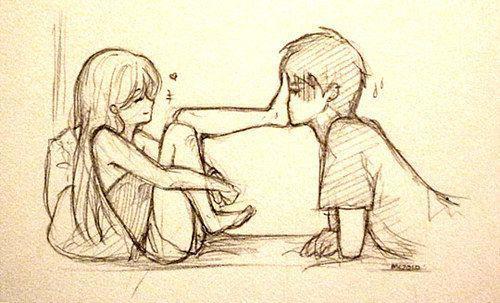The art of declaring or confessing love in Japan is known as Confession [告白] in the case of inviting a person to go out or date after declaring, use Tsukiatte kudasai [付き合ってください].
Earlier we talked about the different ways of saying i love you in japanese. In this article, we're going to talk about these two essential words that go from declaring feelings to dating in the Japanese language.
The Japanese have a little difficulty when it comes to declaring themselves. Most of the time the biggest enemy is “shyness”. In Japan it's not uncommon for girls to confess their love to boys, so this article is for everyone.
Kokuhaku [告白] - Confessing your love in Japanese
Confession [告白] literally means "confession", and is done when a man or woman declare your love to another, and hopes to start dating that person soon afterwards. The word can also mean recognition and even confessional.
The word Kokuhaku is composed of the ideogram [告] which means to reveal, tell, inform and announce together with the white color ideogram [白] which also conveys the idea of speaking and innocence. The tenor of the word is not always romantic.
In the West it is common for people to start dating without any declaration of love. The Japanese, on the other hand, find it necessary to express their true feelings before starting a relationship. That doesn't mean you have to declare yourself in order to get a date.
You can befriend the person, hang out with them for a while, and finally work up the courage to come out. When that happens, and if you're reciprocated, you're officially dating.
Most of the Japanese relationships are with friends who had a lot of coexistence. It's really hard to declare yourself to a person you don't know well, but that doesn't mean it's impossible.

Phrases to confess your love in Japanese
The most basic way to confess is to say:
- 好きです。付き合ってください。
- すきです。つきあってください。
- I like you. Please go out with me.
- I love you, can we start dating?
This expression is very informal, of course you won't just say that. You can say something more complete like I really like you [あなたのことが大好きです]. This expression has the addition of pronouns and the expression koto [事].
The koto in the sentence increases the power of the statement by saying something like: "I love everything in you". This expression makes it clear that you love the person deeply in a romantic way, showing a genuine love that focuses on the quality and interior of the person.
Some adults already declare themselves saying:
- 結婚を前提にお付き合いさせてください
- kekkon o zentei ni otsukiai sasetekudasai
This means: "I would like to have a relationship with you, with the aim of an eventual marriage.“Many find it a waste of time to date someone without planning a wedding. Don't even think about saying that to strangers!
If the person rejects your feelings or refuses to date or date you, it clearly means you've been dumped. Getting dumped in Japanese is furareru [振られる] where literally she pierced his… Sometimes a person may take a while to respond to his feelings, he may think about the case. get ready for the furareru.

Tsukiatte kudasai [付き合ってください] - Japanese Dating Request
The expression tsukiate kudasai [付き合ってください] is a request for a date. Note that together with the expression kudasai refers to a request, a please, wants to date me? Or do you want to go out with me?
The verb tsukiau [付き合う] in addition to dating, it conveys an idea of socializing, associating, keeping company, going steady with, continuing with, following up with, committing to and things like that. It is a very broad word.
It is important to be careful with the verb "tsukiau". While the broad definition is "to socialize", the meaning changes a lot according to the context. The main meaning is "to accompany someone somewhere", without any romantic involvement.
Speak tsukiate kudasai without saying your feelings, it can end up sounding like going on a date or going somewhere together without romantic involvement or like a test.
The verb tsukiau is also used to indicate that 2 people are dating or dating. See some example sentences:
- あの二人,付き合ってるでしょう.
- futari ano, tsukiatteru deshou
- Those two? I think they are a couple.
- つきあっている人がいますか?
- tsuki atte iru hito ga imasu ka
- Are you dating someone?
The verb tsukiau can also be used for things other than relationship. Like, you can use the verb to express that you're saving, supporting and things like that.

Deeto [デート] - Going out on a date in Japanese
Another way to talk about dating in Japanese would be through the word deeto [デート] which derives from the English word “date”. This word can refer to either an encounter or a relationship, just like the word tsukiate.
You might wonder if there's a difference between "deeto" It is "tsukiau". Good, deeto would be used for some casual encounters with someone, while “tsukiau” implies a deeper relationship with that person.
The word was first introduced into the Japanese language in the late 19th century and became popular among middle-class young women during the 20th century. It was used to express the day and time when a man and a woman decide to meet.
The introduction of American dating culture was a culture shock as previously, Japanese people didn't date casually but always with the marriage mentality. See some interesting phrases below:
- デートする
- deeto suru
- go out on a date
- デートに行ってくれますか?
- Can you give me the date?
- Do you want to go on a date?
- 付き合うまで何回デートする?
- tsukiau made nan kai deeto suru?
- How many dates before a relationship?

The article is still halfway through, but we recommend also reading:
Japanese declaring their love
It takes a lot of courage to declare your love, the Japanese are not good at that either. According to research carried out on “Confession” conducted by Unilever in 2011. Of the 300 people interviewed, 79% of them can't confess their love, because they don't know what the person thinks of them, or because they don't have confidence in themselves. I think most people are afraid to take a furareru.
Most agreed that they would confess their love if they were absolutely sure it would be accepted. Of those who declared their love, only 21% regretted it. While 52% regretted not having confessed their love.
Another problem among the Japanese is that most of them declare themselves in an unexpected way, even scaring the women. There are many reports of girls receiving a confession from people they have never talked to or even never seen in their lives.

Be careful not to make any mistakes when declaring yourself. There are some rules you can keep in mind before confessing your love:
- Never confess through text.
- Never reveal too many things you know about the other person. It might scare her.
- Avoid making a public confession.
- If you are a stranger and don't know the person. Not flowers.
Below we have some videos of some Japanese who performed their Confession in public:
I don't know if it's clear enough, but it doesn't matter if you're a man or a woman, if you like someone, do the same. Confession. Thank you for reading our article, I hope you enjoyed it, I appreciate all the comments and shares.






